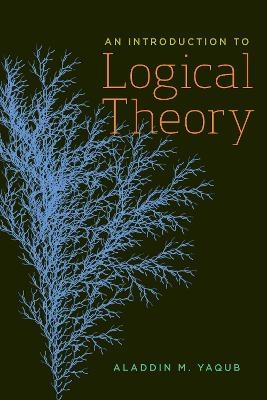
An Introduction to Logical Theory
Broadview Press Ltd (Verlag)
978-1-55111-993-9 (ISBN)
This book reclaims logic as a branch of philosophy, offering a self-contained and complete introduction to the three traditional systems of classical logic and the philosophical issues that surround those systems.
The exposition is lucid, clear, and engaging. Practical methods are favoured over the traditional, and creative approaches over the merely mechanical. The author's guiding principle is to introduce classical logic in an intellectually honest way, and not to shy away from difficulties and controversies where they arise. Relevant philosophical issues, such as the relation between the meaning and the referent of a proper name, logical versus metaphysical possibility, and the conceptual content of an expression, are discussed throughout. In this way, the book is not only an introduction to the three main systems of classical logic, but also an introduction to the philosophy of classical logic.
Aladdin M. Yaqub is Professor of Philosophy at Lehigh University and the author of An Introduction to Metalogic, The Liar Speaks the Truth, and a new translation of Al-Ghazali’s Moderation in Belief.
Introduction and Instructor’s Guide
Chapter One: Informal Logic
1.1 Taxonomy of Arguments
Definition of an argument
Types of link
Deductively valid and invalid arguments
Deductively sound and unsound arguments
Deductive logic
Deductive Arguments
Probabilistic arguments
Probabilistic logic
Cogent arguments
1.2 Classical Deductive Logic and the Notion of Logical Possibility
Definition of a logical possibility
Classical truth values and bivalence
Deductive validity and logical consequence
Definition of deductive validity
Definition of deductive invalidity
Definition of logical truth
Definition of logical falsehood
Definition of contingency
Definition of logical equivalence
Definition of consistency
Definition of inconsistency
Relevant logical possibilities
Examples and counterexamples
1.3 Exercises
Solutions to the Starred Exercises
Chapter Two: Term Logic (TL)
2.1 The TL Worldview
2.2 The Syntax of TL
The basic vocabulary of TL
TL sentences
Non-recursive generative grammar
2.3 Translating English into TL
General terms
Singular terms
Universal and existential quantifiers
Translating English idioms into TL
2.4 The Semantics of TL
TL diagrams
Similar TL diagrams
The truth conditions of TL sentences
Truth values of TL sentences on similar TL diagrams
2.5 Logical Concepts in TL
Definition of a TL argument
Logical possibilities and TL diagrams
Definition of deductive validity in TL
Definition of deductive invalidity in TL
Definition of logical truth in TL
Definition of logical falsehood in TL
Definition of contingency in TL
Definition of logical equivalence in TL
Definition of consistency in TL
Definition of inconsistency in TL
The decidability of logical concepts in TL
The representability of logical possibilities by TL diagrams
2.6 Exercises
Solutions to the Starred Exercises
Chapter Three: Sentence Logic (SL)
3.1 The SL Worldview
3.2 The Syntax of SL
The basic vocabulary of SL
SL sentences
Types of SL compound sentences
SL construction trees
A convention
Generative recursive grammar
3.3 Translating English into SL
Translating English connectives into SL connectives
Translating English idioms into SL
3.4 The Semantics of SL
SL truth valuations
The truth conditions of SL sentences
Truth tables
Truth analysis
3.5 Logical Concepts in SL
Definition of an SL argument
Logical possibilities and SL truth valuations
Definition of deductive validity in SL
Definition of deductive invalidity in SL
Definition of logical truth in SL
Definition of logical falsehood in SL
Definition of contingency in SL
Definition of logical equivalence in SL
Definition of consistency in SL
Definition of inconsistency in SL
The decidability of logical concepts in SL
The representability of logical possibilities by SL truth valuations
3.6 Exercises
Solutions to the Starred Exercises
Chapter Four: Predicate Logic (PL)
4.1 The PL Worldview
4.2 The Syntax of PL
The basic vocabulary of PL
PL quantifiers and PL terms
PL formulas
Bound and free variables and PL sentences
PL construction trees
Three conventions
Generative recursive grammar
4.3 Translating PL into English and English into PL
4.4 The Semantics of PL
PL interpretations
The size of a PL interpretation
The truth conditions of PL sentences
Bivalence and classical truth
4.5 Logical Concepts in PL
Definition of a PL argument
Logical possibilities and PL interpretations
Definition of deductive validity in PL
Definition in deductive invalidity in PL
Definition of logical truth in PL
Definition of logical falsehood in PL
Definition of contingency in PL
Definition of logical equivalence in PL
Definition of consistency in PL
Definition of inconsistency in PL
The undecidability of logical concepts in PL
The relation between TL and PL and the relation between SL and PL
The representability of logical possibilities by PL interpretations
4.6 Exercises
Solutions to the Starred Exercises
Chapter Five: Classical Proof Theory
5.1 The Notion of Demonstrative Proof
5.2 The Notion of Formal Derivation
Definition of a formal derivation
The Soundness Theorem for PL
The Completeness Theorem for PL
Corollaries of the Soundness and Completeness Theorems
The Compactness Theorem
5.3 The Natural Deduction System (NDS)
Types of NDS rules
The NDS rules of inference
The Gentzen Deduction System (GDS)
5.4 Strategies for Constructing Formal Derivations
5.5 Exercises
Solutions to the Starred Exercises
Index
| Erscheint lt. Verlag | 1.6.2013 |
|---|---|
| Sprache | englisch |
| Maße | 178 x 229 mm |
| Themenwelt | Geisteswissenschaften ► Philosophie ► Logik |
| Mathematik / Informatik ► Mathematik ► Logik / Mengenlehre | |
| ISBN-10 | 1-55111-993-5 / 1551119935 |
| ISBN-13 | 978-1-55111-993-9 / 9781551119939 |
| Zustand | Neuware |
| Haben Sie eine Frage zum Produkt? |
aus dem Bereich


